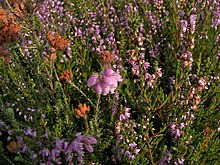Erika (song)
"Erika" is a German marching song. It is primarily associated with the German Army, especially that of Nazi Germany, although its text has no political content.[1] It was created by Herms Niel and published in 1938, and soon came into usage by the Wehrmacht. It was frequently played during Nazi Party public events.[citation needed] According to British soldier, historian, and author Major General Michael Tillotson, it was the single most popular marching song of any country during the Second World War.[2]
Origins
[edit]"Erika" is both a common German female name and the German word for heather. The lyrics and melody of the song were written by Herms Niel, a German composer of marches. The exact year of the song's origin is not known; often the date is given as "about 1930",[3] but this has never been substantiated. The song was originally published in 1938 by the publishing firm Carl Louis Oertel in Großburgwedel, but it had been popular prior to that.[4]
Music
[edit]The song begins with the line "Auf der Heide blüht ein kleines Blümelein" (On the heath a little flower blooms), the theme of a flower (Erika) bearing the name of a soldier's sweetheart.[2] After each line, and after each time the name "Erika" is sung, there is a three beat pause, which is filled by the kettledrum or stamping feet (e.g. of marching soldiers), shown as (xxx) in the text below.

Lyrics
[edit]
1. Auf der Heide blüht ein kleines Blümelein |
On the heath there blooms a little flower |
In politics and culture
[edit]- Hell Let Loose, a tactical first-person shooter based in WW2 that uses the song when the Axis (German) side wins a round.[6]
- Girls und Panzer, a Japanese anime series about WW2-era tanks being maintained and used as a school sport for girls includes the song (used without lyrics) for the school that uses Nazi Germany's tanks.
- Strike Witches, another Japanese anime series includes the song as an OST with Japanese lyrics.
- In June 2024, members of the University of Warwick Conservative Association were allegedly reported to have sung and danced to the song during an annual event.[7][8] University of Warwick representatives condemned the actions of the students.[9] The association stressed that it was requested by a single member who was "no longer welcome", and apologised for any offence caused.[10]
References
[edit]- ^ HF (29 July 2019). "Two Songs, Two Flowers: 'Edelweiss' and 'Erika'". german-way.com. Retrieved 5 March 2024.
- ^ a b Tillotson, Michael (3 September 2016). "Songs soldiers sang in the face of battle". The Times. London. p. 81. Retrieved 18 April 2023.
- ^ "'Weiße Haid' war in Schlammersdorf und Riggau einst Weihbüschelpflanze – Lieder besingen ...: 'Als ich gestern einsam ging ...'". onetz.de (in German). 17 October 2008. Retrieved 12 October 2023.
- ^ Berszinski, Sabine (2000). Modernisierung im Nationalsozialismus? : Eine soziologische Kategorie und Entwicklungen im deutschen Schlager 1933–45 [Modernization under National Socialism? : A Sociological Category and Developments in German popular music 1933–45] (magister thesis) (in German). Institut für Soziologie, Albert-Ludwigs-Universität Freiburg. p. 54.
- ^ "Auf der Heide blüht ein kleines Blümelein (Erika)", volksliederarchiv.de
- ^ "Youtube - German Soldier's Song - "Erika - Germany Win on Hell Let Loose". Retrieved 1 July 2024.
- ^ Fox, Andrew. "Tory student group apologises after members 'danced to Nazi song'". The Sunday Times. Times Media Limited. Retrieved 30 June 2024.
- ^ Brown, Faye. "Warwick: Tory student group apologises over video 'showing members singing and dancing to Nazi song'". Sky News. Retrieved 30 June 2024.
- ^ Price, Richard. "Students' Nazi song video branded reprehensible". BBC News. British Broadcasting Corporation. Retrieved 30 June 2024.
- ^ Pogrund, Gabriel (30 June 2024). "Tory student group apologises after members 'danced to Nazi song'". The Sunday Times. p. 2.
External links
[edit] Media related to Erika (song) at Wikimedia Commons
Media related to Erika (song) at Wikimedia Commons- "Erika", lyrics and recordings, ingeb.org
